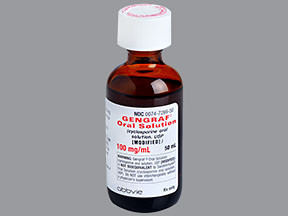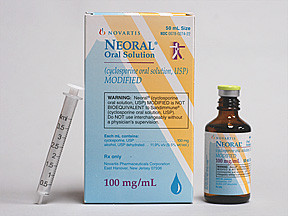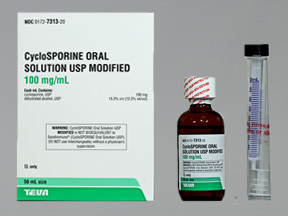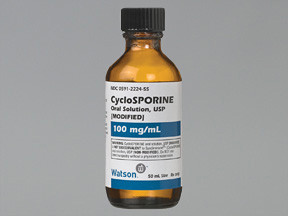CYCLOSPORINE MICROEMULSION SOLUTION - ORAL
PHONETIC PRONUNCIATION: (SYE-kloe-SPOR-in MY-crow-ee-MULL-shun)
COMMON BRAND NAME(S): Gengraf, Neoral
GENERIC NAME(S): cyclosporine, modified
Uses
USES: Cyclosporine is used to prevent organ rejection in people who have received a liver, kidney, or heart transplant. It is usually taken along with other medications to allow your new organ to function normally. Cyclosporine is also used to treat severe cases of rheumatoid arthritis and plaque psoriasis. In these conditions, the body's defense system (immune system) attacks healthy tissues. Cyclosporine belongs to a class of drugs known as immunosuppressants. It works by weakening the immune system to help your body accept the new organ as if it were your own (in the case of an organ transplant) and to prevent further damage to your joints (in the case of rheumatoid arthritis) or skin (in the case of psoriasis).
How to use CYCLOSPORINE MICROEMULSION SOLUTION - ORAL
HOW TO USE: Take this medication by mouth as directed by your doctor, usually twice daily. You may take this medication with or without food, but it is important to choose one way and take this medication the same way with every dose. The dosage is based on your weight, medical condition, lab tests, and response to treatment. Carefully measure the dose using the medicine syringe provided. Do not use a household spoon because you may not get the correct dose. To help improve the taste, you should mix the measured dose with a glass of orange or apple juice that is at room temperature. Do not switch juices often. Do not mix this medication with milk since it may cause it to have a bad taste. Make sure to use a glass cup and not a plastic cup. Drink all of the mixture right away. Do not prepare a supply in advance. To make sure you have taken all of the medication, rinse the glass with more juice, then mix and drink. Consult your pharmacist if you have any questions. Dry the outside of the syringe after use. Do not rinse it with water. If the syringe must be cleaned, make sure that it is completely dry before using it again. Avoid eating grapefruit or drinking grapefruit juice while using this medication unless your doctor or pharmacist says you may do so safely. Grapefruit can increase the chance of side effects with this medicine. Ask your doctor or pharmacist for more details. Use this medication regularly to get the most benefit from it. To help you remember, take it at the same times each day. It may take up to 4 months before you get the full benefit of this drug for the treatment of rheumatoid arthritis and psoriasis. Tell your doctor if your condition does not get better (in 4 to 8 weeks for arthritis and in 2 to 4 weeks for psoriasis) or if it gets worse.
Side Effects
Precautions
Interactions
Overdose
Images
Reviews
Faq for CYCLOSPORINE MICROEMULSION SOLUTION - ORAL
Cyclosporine Microemulsion Solution - Oral is a medication used to prevent organ rejection in patients who have undergone an organ transplant. It works by suppressing the immune system.
Cyclosporine Microemulsion Solution - Oral should be taken exactly as prescribed by your doctor. It is usually taken once or twice daily, with or without food. It is important to continue taking this medication even if you feel well unless instructed otherwise by your doctor.
Common side effects include headache, nausea, vomiting, stomach upset, increased hair growth, tremors, and high blood pressure. If these side effects persist or worsen, you should contact your doctor.
It is important to avoid exposure to sunlight or UV rays as Cyclosporine can increase your skin's sensitivity to sunlight. Therefore, using protective clothing and sunscreen is advised. Also, avoid grapefruit or grapefruit juice while taking this medication as it may interact with Cyclosporine.
Yes, Cyclosporine can interact with certain medications such as antibiotics, antifungals, blood pressure medications, and certain immunosuppressants. It is crucial to inform your doctor about all the medications you are currently taking to avoid potential interactions.
Yes, it is important to follow any special dietary instructions provided by your doctor. Some patients may require a low-fat diet while taking this medication.
The effectiveness of Cyclosporine can vary depending on the individual and the specific condition being treated. It may take several weeks or even months to notice the full benefits of this medication.
It is generally not recommended to consume alcohol while taking Cyclosporine as it can increase the risk of certain side effects and may negatively interact with the medication. It is best to consult with your doctor regarding alcohol consumption.
If you accidentally miss a dose, take it as soon as you remember. However, if it is close to the time of your next dose, skip the missed dose and continue with your regular dosing schedule. Do not take a double dose to make up for a missed one.
Warning
WARNING: Cyclosporine lowers your ability to fight infections. This may make you more likely to get a serious (rarely fatal) infection or make any infection you have worse. This effect may also increase your risk of getting certain types of cancer (such as skin cancer, lymphoma). Tell your doctor right away if you have any signs of infection or cancer such as sore throat that doesn't go away, fever, chills, cough, burning/frequent urination, unusual skin changes, change in appearance or size of moles, unusual weight loss, swollen lymph glands, unusual lumps, night sweats. Cyclosporine can also cause high blood pressure and kidney problems. The risk of both problems increases with higher doses and longer treatment with this drug. Your doctor will monitor your blood pressure and kidney function while you take this medication. Psoriasis patients who have had certain previous treatments (such as coal tar, methotrexate, radiation treatment, light treatment with PUVA/UVB) are at increased risk to develop skin cancer. Talk to your doctor of the risks and benefits of this medication. Different brands of this medication may deliver different amounts of medication. Do not switch brands of cyclosporine without your doctor's permission and directions.
Disclaimer
IMPORTANT: HOW TO USE THIS INFORMATION: This is a summary and does NOT have all possible information about this product. This information does not assure that this product is safe, effective, or appropriate for you. This information is not individual medical advice and does not substitute for the advice of your health care professional. Always ask your health care professional for complete information about this product and your specific health needs.




No Reviews Yet